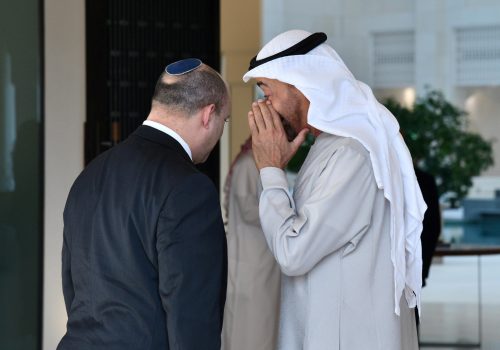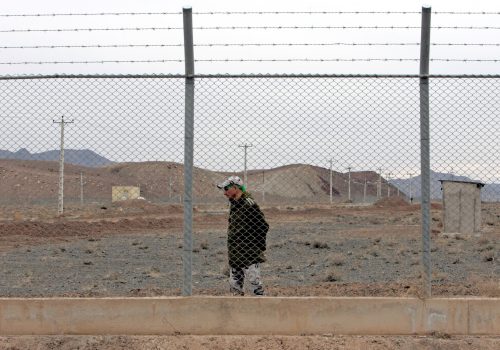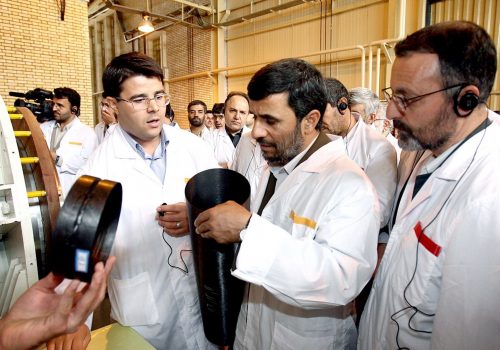Israel’s policy toward Iran is failing by ‘a thousand cuts.’ Here’s why.
Israel has reportedly escalated its attacks on Iran in recent weeks. Unlike the previous government strategy, which focused on sabotaging the country’s nuclear program and assassinating its nuclear scientists, it now appears to have been extended to target other scientists and officers in charge of missile programs and Unmanned Aerial Vehicles (UAVs), as well as members of the Islamic Revolutionary Guard Corps’ (IRGC) Quds Force.
True to his promise to implement “death by a thousand cuts,” Prime Minister Naftali Bennett has apparently approved these attacks (among them, the May 22 assassination of senior IRGC Quds Force officer, Colonel Hassan Sayyad Khodaei).
This incident adds to other recent assassinations and sabotages attributed to Israel, including cyber-attacks, an attack on a secret UAV warehouse on February 14, the suspicious death of an engineer at a major military site for missile development on May 24, and the deaths of two uranium enrichment and UAV developers reported on June 4.
On June 7, Bennett heavily hinted at Israel’s responsibility, telling the Knesset Foreign Affairs and Defense Committee: “The days in which Iran repeatedly hurts Israel, spreads terror through branches in our area, and comes out unharmed, are over…We are operating everywhere, at all times, and we will continue doing so”—a reference to the Octopus Doctrine coined by Bennett.
His statement was criticized by senior members of the Israeli defense establishment, who claimed that such statements only increase Iranian motivation to take revenge on Israel and argued that, at present, it is better to simply remain silent.
The highlight of this Israeli achievement, however, appears to be to convince the Joe Biden administration that the IRGC should be left on the State Department’s list of foreign terrorist organizations. The blacklisting, which has received much praise in Israel, has made it very difficult for Iran to accept a return to compliance with the 2015 nuclear deal, which corresponds well to the official Israel position of opposing the Joint Comprehensive Plan of Action (JCPOA)—despite many former Israeli officials viewing the US withdrawal as a mistake.
To a bystander, it seems that Israel is succeeding in creating confusion and mayhem in the ranks of the Iranian regime. The country has also established its deterrence against Iran in a way that also strengthens the prime minister’s security image domestically at a time when his coalition government is in danger of collapsing.
But the reality of Iran’s nuclear program, revealed on June 6 during the International Atomic Energy Agency’s Board of Governors meeting in Vienna, reveals the depth of Iran’s progress in this area despite Israel’s efforts to thwart it. Iran continues to enrich tens of kilograms of uranium to 60 percent purity, install advanced IR6 centrifuges in an underground facility at Fordow, and produce uranium metal. All these activities would have been banned under the JCPOA that Israel vehemently opposes and successfully lobbied against when Donald Trump was in office (Trump quit the agreement in 2018 despite Iran not violating the deal).
It is also doubtful whether Iran’s failure to explain traces of uranium found at undeclared sites—the subject of a mild censure motion in Vienna on June 8—can be exploited to increase pressure on Tehran.
In the face of these developments, Israel continues to hold a questionable position of demanding “zero enrichment” while relying on an unrealistic “Plan B.” Continued economic sanctions, various covert operations, and a threat to bomb Iran’s nuclear installations haven’t stopped the country’s nuclear program nor changed its behavior, and it is very doubtful if it will succeed in the future.
The Trump era concept of “maximum pressure” no longer works in a world short of oil and willing to bypass sanctions. Iran’s revenues from oil exports under the current sanctions regime illustrates this fact. Not only is Iran already adept at bypassing sanctions, but the Ukraine war has broadened a “coalition of the sanctioned,” including Russia and China, who are willing to defy US threats. The Biden administration is also unwilling to press harder, given high gasoline prices. Arab neighbors of Iran across the Persian Gulf are also fearful of pushing Iran into a corner and it seems that they aren’t keen to enforce the sanctions on Iran, a position that led to the Trump administration openly criticizing the United Arab Emirates for turning a blind eye to sanctions evasion.
The notion that there is a “credible military threat” against Iran’s nuclear program is also incorrect. The last time Iran felt truly threatened was in 2003, when tens of thousands of US forces invaded Iraq; others remained in Afghanistan and Tehran feared it was next in line. This kind of threat simply cannot return given other, more pressing crises and the US desire to reduce its military presence in the Middle East.
So, while Israel continues to enjoy impressive tactical successes, strategically, Israel hasn’t achieved its goal of preventing Iran from having an advanced nuclear program.
Israel is still holding a decade-old mentality without understanding that the world has changed and that, specifically, Iran’s nuclear program has evolved. In fact, the base for Israel policy is still founded on the thought that one can deprive Iran from its nuclear capabilities, even though Iran’s nuclear program is not what it was a decade ago. Iran has succeeded in overcoming significant technological barriers, especially in the field of enrichment and centrifuge production. The knowledge in Iran is broad and exists in the minds of countless nuclear scientists—far more than can be eliminated.
Worse, even if the nuclear facilities miraculously disappeared tomorrow, Iran would be able to reconstitute them within a few months because of the technological knowledge that exists in the country. Moreover, according to a Chicago Council survey, the nuclear program enjoys support in Iran and, therefore, even if the leader of the country or the regime changed tomorrow, it is unlikely that the program would be abandoned.
Finally, Israel’s strategy of a thousand cuts in a so-called “war between the wars” has also been applied to regional issues. However, Israeli attacks on Syria and Lebanon have not changed Iran’s posture nor undermined Lebanese Hezbollah.
Although Iran is a problem for the international community, Israel has moved to the forefront of the battle against Iran in a way that exposes it to Iranian retaliation.
Considering these facts, Israel is achieving only a Pyrrhic victory against Iran. At best, Israeli attacks are stalling the program; at worst, they are incentivizing Iran to move faster. Israel needs to recalculate and adopt a strategy that corresponds to the current state of the Iranian nuclear program and will allow Israel to have more influence over international opinion.
The bottom line is that Israel is piling up tactical successes while its Iran strategy is failing. There is a growing gap between the statements of senior Israeli officials and the reality on the ground. It is necessary to adopt a balanced policy that considers the state of the Iranian nuclear program before it’s too late. Israeli officials need to remember that pushing Iran into a corner and changing the equation of deterrence between the countries could lead to a sharp response from Tehran that could end in a regional confrontation.
Danny Citrinowicz is a nonresident fellow with the Atlantic Council’s Middle East Programs. He served for twenty-five years in a variety of command positions units in Israel Defense Intelligence (IDI) including as the head of the Iran branch in the Research and Analysis Division (RAD) in the Israeli defense intelligence and as the division’s representative in the United States. Follow him on Twitter: @citrinowicz.
Further reading
Mon, Mar 21, 2022
Israel and Iran need to turn down the heat. The UAE could be the best choice as conduit.
IranSource By
The UAE could help defuse tension with Iran at a time when Israeli military activity in Syria continues against Iran.
Mon, Dec 20, 2021
I once headed the Iran branch of Israel’s military intelligence research. Here’s why Israel can’t take out Iran’s nuclear program.
IranSource By
Besides the operational challenges in executing such a military attack, especially given Iranian forces’ buildup of surface-to-air units, there are other more strategic challenges facing Israel.
Tue, Dec 8, 2020
A history of continuity in Iran’s long nuclear program
IranSource By Sina Azodi
Iran’s interest in developing a nuclear deterrent is often attributed to the Islamic Republic. However, in reality, this interest predates the 1979 revolution and reflects a deep-seated desire for national prestige and development, as well as a need to deter regional rivals.
Image: Funeral of assassinated Iranian nuclear scientist November 30, 2020, Mashhad, Razavi Khorasan, Iran: A handout picture provided by the Iranian defense ministry office shows the coffin of slain Iranian nuclear scientist Mohsen Fakhrizadeh is being carried inside the Shrine of Imam Reza, during a funeral ceremony in the city of Mashhad, northeastern Iran, 29 November 2020. With a funeral worthy of the Islamic Republic s greatest martyrs , Tehran paid a final tribute to a scientist killed in an assassination blamed on Israel and promised to continue his work. Fakhrizadeh died on November 27 in a hospital from his wounds after assailants targeted his card and engaged in a gunfight with his bodyguards outside Tehran, according to Iran s defen Poolfoto ZUMAPRESS.com


